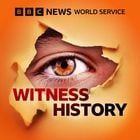
Witness History
Oct 8, 2025
On 10 October 1961, a volcanic eruption threatened the population of Tristan da Cunha, a British Overseas Territory in the South Atlantic, and all 264 islanders were evacuated to the UK.
Two years later, the majority voted to return.
In an interview she gave to the BBC in 1961, Mary Swain describes what it was like to survive the preceding earthquake and landside and be relocated to the other side of the world.
Produced and presented by Rachel Naylor, in collaboration with BBC Archives.
Eye-witness accounts brought to life by archive. Witness History is for those fascinated by the past. We take you to the events that have shaped our world through the eyes of the people who were there. For nine minutes every day, we take you back in time and all over the world, to examine wars, coups, scientific discoveries, cultural moments and much more. Recent episodes explore everything from the death of Adolf Hitler, the first spacewalk and the making of the movie Jaws, to celebrity tortoise Lonesome George, the Kobe earthquake and the invention of superglue. We look at the lives of some of the most famous leaders, artists, scientists and personalities in history, including: Eva Peron – Argentina’s Evita; President Ronald Reagan and his famous ‘tear down this wall’ speech; Thomas Keneally on why he wrote Schindler’s List; and Jacques Derrida, France’s ‘rock star’ philosopher. You can learn all about fascinating and surprising stories, such as the civil rights swimming protest; the disastrous D-Day rehearsal; and the death of one of the world’s oldest languages.
(Photo: Evacuees from Tristan on board a Dutch liner bound for Cape Town on 21 October 1961. Credit: Central Press / Getty Images)

